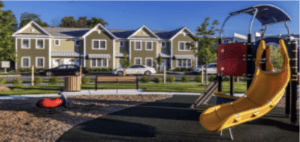 Since 1968, the fair housing and community development fields have pursued a variety of approaches and strategies to create greater opportunity for lower-income communities and communities of color. Yet segregated housing patterns continue to be the norm across the country, shutting these communities out of high opportunity areas. To achieve the outcomes of reducing racial and economic segregation and de-concentration of poverty, the community development and fair housing sectors must come together to support a shared vision, common indicators of success, and new policy innovations. PRRAC has engaged in several related projects that seek to achieve this resolution.
Since 1968, the fair housing and community development fields have pursued a variety of approaches and strategies to create greater opportunity for lower-income communities and communities of color. Yet segregated housing patterns continue to be the norm across the country, shutting these communities out of high opportunity areas. To achieve the outcomes of reducing racial and economic segregation and de-concentration of poverty, the community development and fair housing sectors must come together to support a shared vision, common indicators of success, and new policy innovations. PRRAC has engaged in several related projects that seek to achieve this resolution.
Advocacy Letters and Testimony
- Capital Magnet Fund application form (November 2024)
- NFHA Coalition letter on Treasury Department housing programs (February 2024)
- Comments regarding the Capital Magnet Fund and AFFH (September 2023)
- PRRAC comments on proposed methodology for calculation of Fair Market Rents (July 2023)
- Letter to the Interagency Community Investment Committee (December 2022)
- RE: Comments on EPA’s Civil Rights Obligations in Designing and Implementing the Greenhouse Gas Reduction Fund (Title VI Alliance, December 2022)
- PRRAC comments on proposed Community Reinvestment Act regulations, August 2022
- Request for Input Regarding the Enterprises’ Equitable Housing Finance Plans (PRRAC, October 2021)
- Advance Notice of Proposed Rulemaking (ANPR) Regarding the Community Reinvestment Act (PRRAC, November 2018)
- Letter to IRS on Treasury Department Notice 2016-77, Re: the “Concerted Community Revitalization Plan” Requirement (PRRAC et al, February 2017)
- Fair Housing Comments on Capital Magnet Fund Interim Rule (PRRAC, LCCUL, & NFHA, May 2016)
- Affirmatively Furthering Fair Housing in the Disposition of REO Properties (PRRAC et al, September 2011)
- Comment letter to Dept. of Transportation on Discretionary Grants NOFA (June 1, 2009)
- Testimony of PRRAC and The Inclusive Communities Project on the Community Reinvestment Act
Housing Opportunity, Community Development, and Civil Rights: Toward a Shared Vision
Between 2010-2014, PRRAC worked closely with the Lawyers Committee for Civil Rights Under Law and Enterprise Community Partners on an ongoing project of dialogue and consensus-building with low-income housing developers and community development practitioners, supported by the Ford Foundation and the Open Society Foundations. Our goals were to explore barriers and incentives to expanding locational choices for low-income families, and new approaches to comprehensive community development in distressed and gentrifying communities, consistent with fair housing goals. We remain grateful for the ongoing partnerships that resulted from this initiative. Presentations and research from our November 2012 national meeting are collected here, and presentations from our September 2013 regional meeting are collected here.
Inclusive Gentrification? Strategies for Diverse and Stable Urban Neighborhoods
Can gentrification be managed to protect and benefit existing residents of changing neighborhoods? The project looks at different methods for promoting equity by examining case studies from across the nation. Read more here.
Public Housing Redevelopment
Balancing fair housing and the right to return in public housing redevelopment. The important civil rights issues surrounding the HOPE VI program – including the right to return to the redeveloped site, the impacts of relocation on nearby neighborhoods, and the right to expanded housing opportunities throughout the region – cannot be considered without an understanding of the historical use of public housing as a policy to segregate and contain poor people of color. The history of public housing development, beginning in the era of Jim Crow and continuing through the late 1950s and 60s, must be understood in the context of each city and region where a HOPE VI redevelopment is proposed.
The Obama Administration’s “Choice Neighborhoods” programs addresses two of the key flaws of the HOPE VI program, by guaranteeing one-for-one replacement of hard units in most situations, and guaranteeing former residents the right to occupy a redeveloped or replacement unit. However, the Choice Neighborhoods program continues to fall short in its promise to offer residents strong housing relocation options, or a portion of off site replacement housing in communities of opportunity.
- An Early Assessment of Off-Site Replacement Housing, Relocation Planning and Housing Mobility Counseling in HUD’s Choice Neighborhoods Initiative, by Martha Galvez (PRRAC research & policy report, March 2013)
- Statement of Civil Rights Principles on the Reauthorization of the HOPE VI Public Housing Revitalization Program (March 2008)
- Fair Housing Analysis of the Public Housing Replacement Bill (May 2010)
- Fair Housing and the Choice Neighborhoods Program (March 2010)
You must be logged in to post a comment.